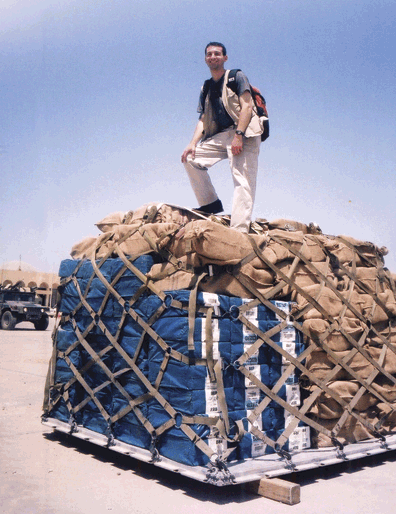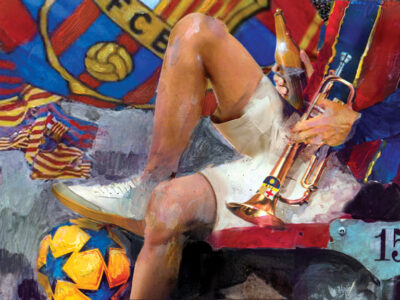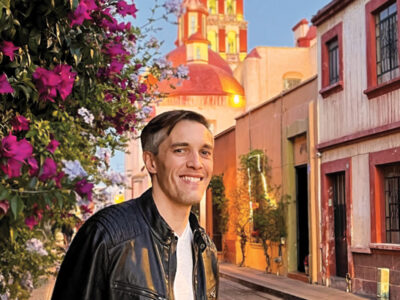
Class of ’96 | Jeremy Kahn C’96, now managing editor of The New Republic, is no stranger to tough questions: as a journalist, it comes with the territory. But in May of 2003, he found himself scrambling for answers.
Kahn was fresh off the plane in Kuwait City, sent to the region byFortune magazine to cover a team of United States Treasury advisors who were in Iraq trying to reestablish the nation’s banking system and economy. With no other way into the war-torn country, he rented an SUV from Avis. When the Avis representative asked why Kahn would need a roof rack to hold jerry cans of extra fuel, he responded that he just planned on “off-roading” in scenic Kuwait. He didn’t get his roof rack.
Undaunted, Kahn and another journalist hit the back roads in a Mitsubishi Pajero, with 120 liters of extra gas precariously balanced on the back seat and a map of the unmarked roads of Iraq provided by a Los Angeles Timesreporter. They made it to Baghdad, where Kahn was able to do the legwork for his story and file it without major incident. But his resourcefulness and luck were put to the test when he headed back to Kuwait.
Unable to find a companion, he decided to make the trip himself—which was, he now acknowledges, “an idiotic idea.” With the heat sometimes hitting 128 degrees and the back of the SUV filled with reeking gas containers—causing Kahn to alternate between the inadequate air conditioning and open windows that let in the choking desert dust—Kahn drove, and drove, and drove … until suddenly he heard “this horrible metal-on-metal grinding sound.”
“I realized that I must have passed out from the gas fumes and the heat,” Kahn recounts. “And then I looked next to me and saw this giant 18-wheel U.S. Army tank carrier next to me and I thought, ‘My God, I must have just collided with that thing.’ And then my next thought was, ‘God, they are going to shoot me. They are going to think I’m a suicide bomber attacking their convoy and just open up on me. And here I am, a driving bomb with all that gasoline in the back of the Pajero.’”
They didn’t shoot. Kahn isn’t even sure if the tank carrier noticed him, since it just kept driving. The SUV, however, had lost most of the paint on one side—which, when he finally arrived at the Avis franchise in Kuwait City, inspired some more tough questions. Someone must have dinged it in the parking lot, Kahn said innocently. The Avis agent told him to report to their counter at the airport the following day for an assessment of the damage.
There the Avis representative accused Kahn of having taken the car to Iraq. When Kahn sheepishly admitted that he had, the representative told him that if he had told them that he was going there, they would have made him get a special insurance policy that would have covered the car in the event of only one eventuality—collision with a U.S. military vehicle. A few thousand dollars poorer and wiser, Kahn got on the plane for home.
Scrapes aside, his career has definitely been on the fast track. After graduating from Penn, where he served a stint as managing editor of The Daily Pennsylvanian, Kahn took a summer internship at Newsweek. He continued to file stories from London while getting his master’s degree in international relations from the London School of Economics—where, appropriately enough, he wrote his thesis on the media’s relation to foreign relations.
Fortune then hired him as a reporter for its international edition, covering the European business world and the general strike in Venezuela, where he also investigated the oil industry. He was twice named one of America’s 30 top financial journalists under the age of 30 by the trade publication TJFR, and his boyish appearance once prompted an Israeli finance minister to conclude an interview by asking: “Have you been bar mitzvahed yet?”
In the fall of 2003, after his return from Iraq, Kahn became a Pew International Journalism Fellow at the Johns Hopkins School of Advanced International Studies in Washington, D.C., a program that enabled him to travel to the Ivory Coast to report on the fallout from the country’s civil war.
“I was very interested in looking at the aftermath of a civil war,” Kahn said in explaining his choice of geographic region. “This was a country that had been stable, which had fallen apart fairly quickly. I was interested in how it happened, how people divide along religious and ethnic lines, and how to put a country back together.” When he arrived in the Ivory Coast, however, he saw that “there was not much reconciliation going on there at all. So I was reporting on why the place was still a mess.”
While there, he wrote for The New Republic and Slate, in addition to covering the war’s impact on the country’s cocoa production for Fortune. In June 2004, soon after returning stateside, he got the call from The New Republic.
As managing editor, Kahn is the third guy from the top in charge, and handles domestic politics and policy coverage.
“I never thought I would be managing editor of any publication when I was 30,” Kahn says modestly; yet his intelligence and youth make him a perfect fit for a magazine where the average staff member is 30 years old.
“It’s fun,” Kahn says. “They’re young, very smart, incredibly hard-working people who are knowledgeable about political esoterica. They’re a bunch of policy wonks who know the ins and outs of tax reform and social security—a really good group.”
In some ways, his new job reminds him of the one he held as an undergrad. “Some of the same skills I learned at the DP are still applicable here: managing people, thinking of story ideas, anticipating what’s coming up in the news. We try to anticipate what people are going to be talking about. In some ways, it feels very much like a college publication.”
—Jordana Horn Marinoff C’95 L’99




